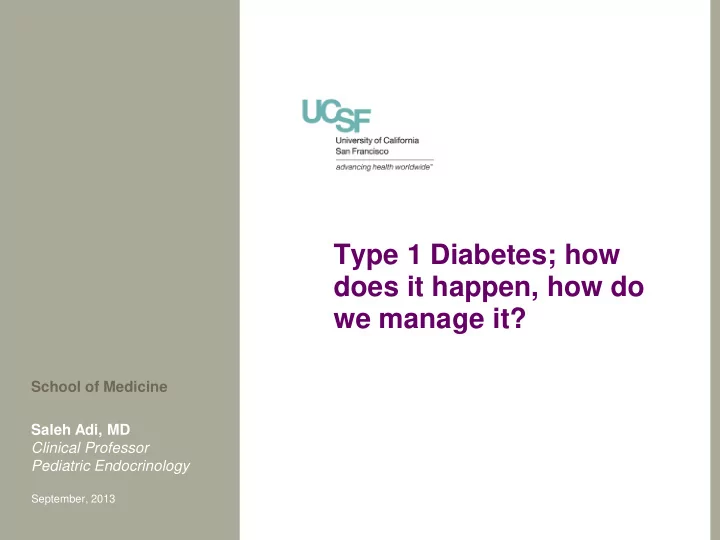

Type 1 Diabetes; how does it happen, how do we manage it? School of Medicine Saleh Adi, MD Clinical Professor Pediatric Endocrinology September, 2013
Family Voices, September 2013 Outline • Normal physiology • Types of diabetes • Type 1 diabetes • Autoimmunity • Management: insulin and devices School of Medicine 2
Family Voices, September 2013 Normal physiology School of Medicine 3
Family Voices, September 2013 Normal physiology: Nutrition School of Medicine 4
Family Voices, September 2013 School of Medicine 5
Family Voices, September 2013 Sugar School of Medicine 6
Family Voices, September 2013 Glucose Metabolism School of Medicine 7
Family Voices, September 2013 Insulin (energy) School of Medicine 8
Family Voices, September 2013 Insulin (energy) School of Medicine 9
Family Voices, September 2013 Insulin An islet School of Medicine 10
Family Voices, September 2013 Diabetes • Glucose cannot enter the cells - No insulin = Type 1 Diabetes - Insulin not working = Type 2 Diabetes • Other types, less common School of Medicine 11
Family Voices, September 2013 Diabetes • Glucose accumulates in the blood • Spills over in the urine (when level is >180) (Normal is 70-110, up to 140) - Takes water with it - Increased urine and thirst School of Medicine 12
Family Voices, September 2013 Type 2 Diabetes Insulin not working • Overweight and lack of physical activity lead to insulin resistance • We make more insulin to compensate • Eventually, islet cells burn out, cannot make enough School of Medicine 13
Family Voices, September 2013 Type 2 Diabetes Treatment • Eliminate the cause: Decrease weight, increase activity • Drugs Help make more insulin Help insulin work better Lower blood sugar (in other ways) • Insulin School of Medicine 14
Family Voices, September 2013 Type 1 Diabetes No Insulin • Trauma – Infection - Surgery • Cystic Fibrosis • Autoimmune (true T1D) School of Medicine 15
Family Voices, September 2013 School of Medicine 16
Family Voices, September 2013 Autoimmunity Gland School of Medicine 17
Family Voices, September 2013 The immune system (very simplified) School of Medicine 18
Family Voices, September 2013 Autoimmunity against Beta cells School of Medicine 19
Family Voices, September 2013 Autoimmunity School of Medicine 20
Family Voices, September 2013 Type 1 Diabetes No Insulin • Treatment: Take insulin! School of Medicine 21
Family Voices, September 2013 Type 1 Diabetes; Management In normal physiology, glucose metabolism is exquisitely controlled; – Blood Glucose (BG) has a tight range – BG levels are sensed continuously – Instantaneous response in the β -cells – Almost immediate and quick effect of insulin – Short lived effect School of Medicine 22
Family Voices, September 2013 Type 1 Diabetes; Management We’re not even close •We check BG every few hours •We deliver insulin every few hours •Insulin action is still too slow •Deliver insulin in subcutaneous space (it takes a while to reach the blood) School of Medicine 23
Family Voices, September 2013 Insulin 1922 School of Medicine 24
Family Voices, September 2013 Insulin Frederick Banting & Charles Best School of Medicine 25
Family Voices, September 2013 Insulin 1990 School of Medicine 26
Family Voices, September 2013 Type 1 Diabetes; Management We need insulin all the time • Long acting insulin, 1 or 2 doses/day • Short acting insulin, for every meal School of Medicine 27
Family Voices, September 2013 Type 1 Diabetes; Management Insulin pump, continuous infusion of short acting insulin School of Medicine 28
Family Voices, September 2013 Type 1 Diabetes; Management Daily tasks, before each meal • Check BG • Count the carbohydrates in the meal • Calculate dose of insulin • Deliver insulin, by injection or insulin pump School of Medicine 29
Family Voices, September 2013 Insulin pumps School of Medicine 30
Family Voices, September 2013 Insulin pumps School of Medicine 31
Family Voices, September 2013 Insulin pumps School of Medicine 32
Family Voices, September 2013 Glucose sensors (Continuous Glucose Monitors) School of Medicine 33
Family Voices, September 2013 Glucose sensors (Continuous Glucose Monitors) A: pump B: infusion set C: sensor D: transmitter School of Medicine 34
Family Voices, September 2013 Type 1 Diabetes; Management Lots of cool tools, but they don’t think for us •What kind of food (fat, fiber, protein) •Activity (before and after) •Time of day •Time of month • Constantly making adjustments School of Medicine 35
Family Voices, September 2013 Diabetes logs School of Medicine 36
Family Voices, September 2013 Diabetes logs School of Medicine 37
Family Voices, September 2013 Closing the loop School of Medicine 38
Family Voices, September 2013 Closing the loop The Artificial Pancreas School of Medicine 39
Recommend
More recommend